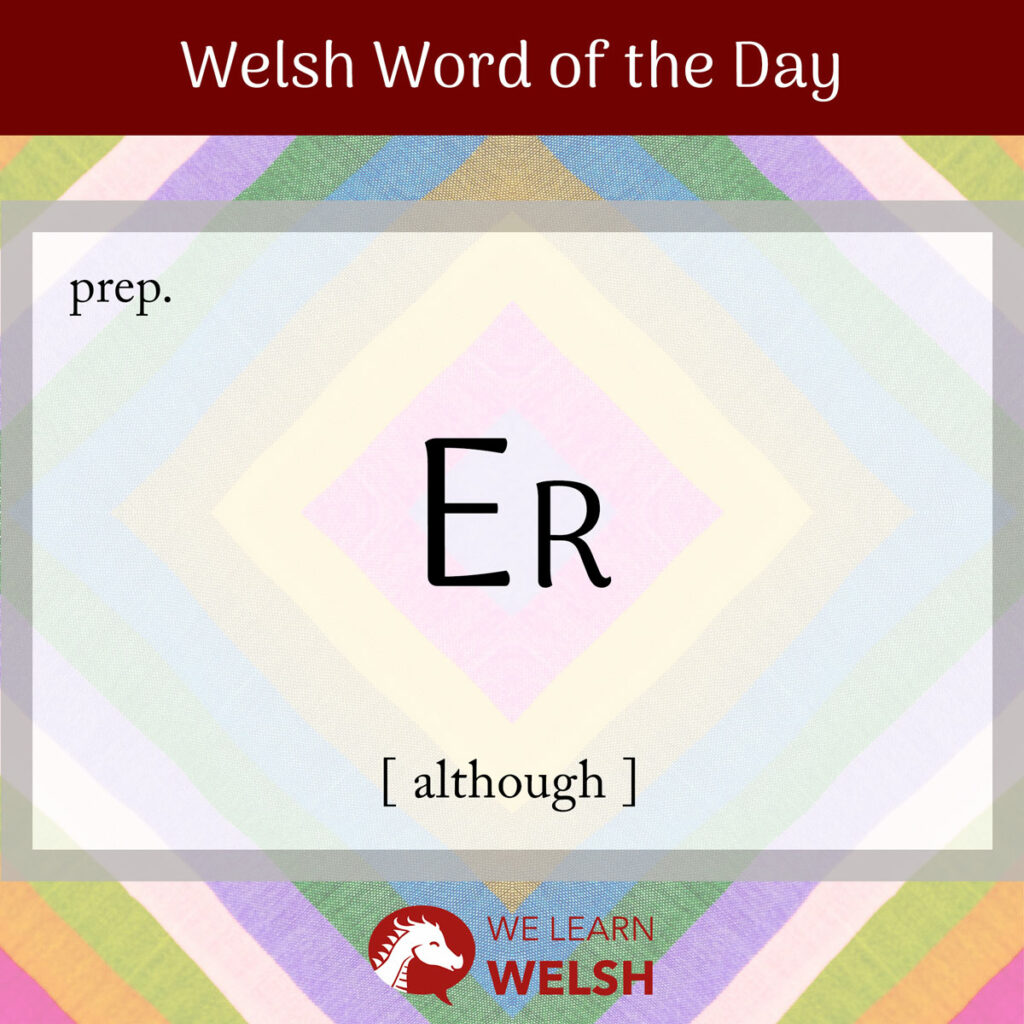Sometimes the littlest words are the most useful! One example of a ‘little word’ that can definitely come in handy when speaking Welsh is er. In English, people tend to use this word when they’re not sure what to say next. In Welsh, it means although.
er
although
The exact same word exists in Cornish, although it has a slightly different meaning, for or by. But both words are still from the same root, the proto-Celtic *pheri. This is related to the Latin word per, which is where we get expressions in modern English like per se and percent.
Since er begins with a vowel, it never undergoes any mutations. It also doesn’t cause any mutations – this is kind of an exception to the rule since a lot of ‘little words’ like this in Welsh cause a soft mutation.
One construction using er that comes up a lot is er bod (although/despite being). At face value, bod remains bod here and doesn’t become fod, since er doesn’t cause a mutation. However, you should technically include a personal pronoun in-between er and bod, especially if you were speaking a bit more formally. In that case, you would use the mutation that was appropriate for that personal pronoun.
- er fy mod (although I am)
- er ein bod (although we are)
- er dy fod (although you are)
- er eich bod (although you are)
- er ei fod (although he is)
- er ei bod (although she is)
- er eu bod (although they are)
Ei as the feminine possessive pronoun doesn’t cause a mutation above, because this pronoun normally results in an aspirate mutation, and bod isn’t susceptible to the aspirate mutation.
Er ei fod yn olygus, dw i ddim yn ei hoffi.
Although he’s handsome, I don’t like him.
Realistically, the most common construction you’d use “although” in is when saying “although it is.” In Welsh, this could be either er ei fod or er ei bod, depending on the gender of the noun it refers to. For example, if you were complimenting a house, saying “although it’s small,” you’d conclude the sentence with er ei fod yn fach, as “house” (tŷ) is masculine.
The other option, if you are speaking casually, is just to drop the personal pronoun and leave it as er bod. This also doubles as a useful trick if you’ve forgotten the gender of the noun you’re talking about!
One other important rule to know with er is that you can’t directly use it in the past tense. So, ceisiais i is I tried, but you can’t say er ceisiais i for although I tried. What you need to do is put the main phrase into the infinitive – in this case, ceisio (to try) – and use the preposition i.
The whole thing comes together in the formula er + i + [the appropriate noun or pronoun] + [the infinitive of the verb]. Many personal pronouns will cause the preposition i to take alternative forms to match (e.g. iddi hi, not i hi). And, just to make things more complicated, the infinitive of the verb also takes a soft mutation in this expression! So, although I tried is er i mi geisio.
Cytunodd Mair er i Sioned anghytuno.
Mair agreed although Sioned disagreed.
You may have come across the concept of emphatic sentences in Welsh. These are simply an alternative way of phrasing your sentences, in which the verb isn’t put at the beginning of the sentence, as it usually would be in the Welsh language.
As the name suggests, this construction adds emphasis to the statement, placing focus on whichever element (be it a noun or something else) is positioned at the start of the sentence. For example, athrawes yw hi (she is a teacher) places emphasis on athrawes (teacher), making it the focal point of the sentence. This differs from the more neutral phrasing, mae hi’n athrawes (she is a teacher), where no particular element is highlighted.
If you ever want to use er with an emphatic sentence, you would need to use the connective particle taw or mai – er taw athrawes yw hi / er mai athrawes yw hi (although she’s a teacher). This would be an alternative to the default phrasing, er ei bod hi’n athrawes.
In older Welsh, er had a wider variety of meanings beyond just although. It could be used to mean since, for, because, or through, among other things. If you’re speaking formally today, er is sometimes still used in place of ers (since). The rule would be that er is used if you are referring to a specific time – er 1843 (since 1843), but ers wythnosau (since weeks ago). However, most people use ers for both in everyday speech.
There are a couple more short phrases that use er that are worth knowing – some of which derive from these earlier usages.
- er hynny = notwithstanding
- er mwyn = in order to
- er na / er nad = although not
- er enghraifft = for example
- er cof = in remembrance of
- er gwaethaf = despite / in spite of
Er gwaethaf is a particularly iconic phrase, as it appears in the anthemic Welsh folk song Yma o Hyd (Still Here).
Er gwaetha pawb a phopeth,
er gwaetha pawb a phopeth,
er gwaetha pawb a phopeth,
ry’n ni yma o hyd.
In spite of everyone and everything,
in spite of everyone and everything,
in spite of everyone and everything,
we are still here.
And the Welsh language is yma o hyd, too – er ei bod yn anodd weithiau (although it’s difficult sometimes) with all its grammatical quirks!

